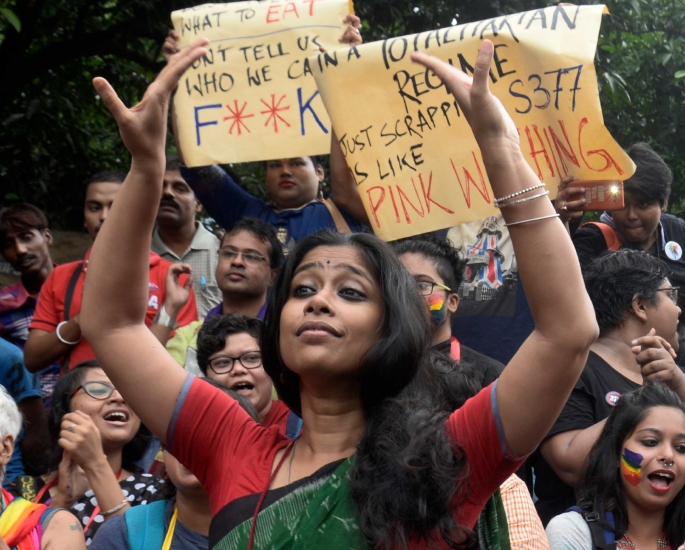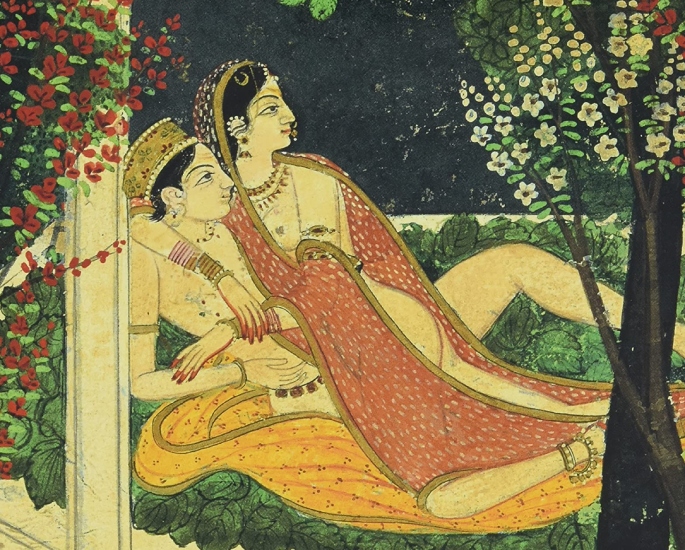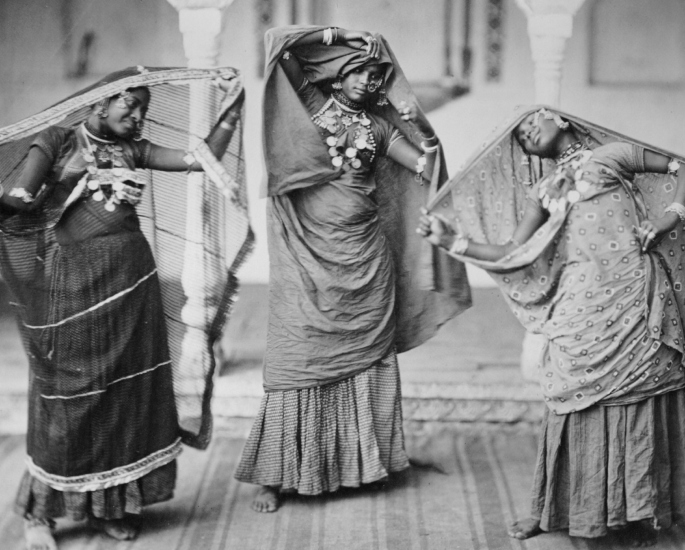Temple prostitution was very common
British colonialism has had a profound impact on India, from the very structures of its culture to India’s sex habits.
Aspects of Indian life like liberated sexual attitudes were scrutinised by colonialism and subjected to intense shame.
Whilst the topic of sex may seem controversial in modern-day India, it was a widely celebrated and inclusive subject before British colonial rule.
DESIblitz looks at how exactly British colonial rule has changed and criticised sexual habits in India.
New Laws and Regulations

British colonialism in India initially began in 1757 when the East India Company took control over parts of India.
From 1858 onwards the British government had total control over India which became known as the British Raj.
With this newfound governance, British colonialism made its mark in India by imposing harsh laws and regulations.
New laws and regulations surrounding sex and human rights dramatically changed the freedoms Indian people had access to.
There was a major criminalisation of traditional sexual practices and expressions like homosexuality, adultery, and prostitution, which were severely outlawed.
There were intense anti-prostitution laws put in place like the Prevention of prostitution act (1923) which struck fear into sex workers and turned them from professionals to criminals.
This law stripped away the sexual and professional freedoms many women had.
In turn, it forced many of them to turn into secret prostitutes and hide their identities, making it seem as though their work was dirty.
Another law introduced to restrict sexual relations in India was the Indian Penal Code (1860) which banned homosexuality in India and left anti-LGBTQ attitudes in the country.
These forced laws and regulations contributed to the more conservative attitudes toward sex that we see today in India.
They also circulated a British, Victorian-style purity culture that spread throughout India, deeming sex as a dirty act rather than a source of pleasure.
The Kama Sutra

The Kama Sutra is an ancient Indian text, initially written in Sanskrit that explores sexuality, love, the enrichment of life, and eroticism.
Its literature promotes not only sexual pleasure and eroticism but also the importance of respecting one’s partner and maintaining balance in life.
However, at the start of British colonial rule, the text was suppressed and censored in India by officials who considered the literature to be obscene and pornographic.
The text has often been considered the epitome of sexual liberation and philosophy in India.
Despite its suppression, Indian scholars continued to study the Kama Sutra as they believed it was an important piece of work that offered guidance on love, life, and sexuality.
This contradicted the view of what British colonials thought of the book.
They believed it to be a symbol of immoral culture which went against their ‘pure’ British values.
In the 19th century, the Kama Sutra became popular in the West. However, their view of this work was a far cry from the original depictions.
Instead, it was spread as a cheap book of pleasure and exotification when brought into the Western world where it was viewed through lenses of exoticism and orientalism.
This meant it was no longer viewed as a serious and meaningful piece of literature as it had been in the East, but it was solely used for fetishised purposes and voyeuristic pleasure.
Despite the impacts of colonialism, the Kama Sutra remains an important cultural artefact that holds a deep history of India’s sex habits.
Sexual Restrictions & Pressure on Modesty

There is plenty of evidence to show that India was a sexually liberated country prior to British colonialism.
Ancient texts, stories, and scriptures show there were limited restrictions on female sexual expression.
For instance, the Indian Mughal Era was a time before colonialism when female sexuality was freely explored.
Women were not looked down upon for engaging in sex work or enjoying the pleasures of sex.
Tawaifs who were essentially high-culture prostitutes during the Mughal Era were highly regarded, as women who engaged in sexual activity.
However, with the introduction of British colonialism came a clamping down on these sexually liberated attitudes and restricted how women chose to present their bodies.
There was a reinforcement of British patriarchal rule and British purity culture that eliminated any form of Indian liberation.
The pressure to be modest meant women were no longer able to be sexually or professionally liberated following colonialism and these attitudes have continued into many modern-day Indian settings.
This pressure also reinforced harmful gender roles in society where women were more often forced to be submissive and servile towards men.
These attitudes towards sex enforced by the British left their mark on India and colonial morality and purity remain to this day.
The Commercialisation of the Sex Trade

At the centre of many enforced changes in India’s sex habits involved sex workers and prostitutes.
Sex work was not a new profession in India before colonialism.
However, the way in which sex workers were treated and attitudes towards their profession changed dramatically following colonialism.
Sex work was a recognised and highly accepted profession in India before British colonial rule.
For instance, temple prostitution was very common in parts of India.
Women called Devadasis dedicated themselves to serving the temple which often included engaging in sexual activity with temple visitors and priests.
These women were very well respected in the community and had a degree of socio-economic independence as well as sexual freedom.
Courtesans, who entertained and engaged in sexual relations with wealthy individuals were also highly respected members of the community and were well-educated and connected.
Despite British rule believing sex work was immoral during colonialism, brothels were set up where Indian women were forced into prostitution that catered to the needs of British men.
These brothels led to the commercialisation of the sex trade in third-world countries.
One example is India where women were treated as objects by British men and traded around in these brothels for sums of money.
Colonial rule had also removed the hierarchies associated with sex work meaning highly regarded sex workers like tawaifs were later pushed into prostitution and their ‘high’ status removed.
Western Medicine

Not all British colonial changes towards India’s sex habits were necessarily bad as some were in favour of improving sexual health across the country.
For instance, British colonialism introduced condoms, contraceptives, and other sexual health support in India.
Condoms were introduced following increasing worries about sexually transmitted diseases and unplanned pregnancies.
By the early 30s, India had been introduced to all sorts of Western medicines that would improve sexual health.
These included birth control, diaphragms, uterine tonics, and chemical contraceptives.
British colonialism also introduced various health campaigns that addressed issues such as prostitution and venereal diseases.
Though these campaigns aimed to educate the Indian public on safer sexual practices, they were not undergone in the right way.
The overall approach to making these improvements and putting them in place did more harm than good.
In some cases, the harsh enforcement of them disregarded local Indian customs and traditions.
The approach by the British colonialists towards improving sexual health also came from a place of judgement and reform rather than wanting to help better the lives of Indians.
Their judgement towards the profession of sex workers led to the Contagious Diseases Act (1864) which required women thought to be sex workers to undergo regular medical examinations.
Whilst this may seem like a beneficial practice in hopes to reduce and treat STI transmission, this process was very invasive and traumatic for many of these women.
Thus, despite British colonialist changes being veiled in good intentions many of them had completely the opposite effect.
These changes destroyed the way of life for many Indians, led their actions to be criminalised, and removed all their sexual freedoms.
British colonialism essentially deconstructed India’s position as a sexually liberated country and created a culture of sexual repression that still exists in some form to this day.






























































